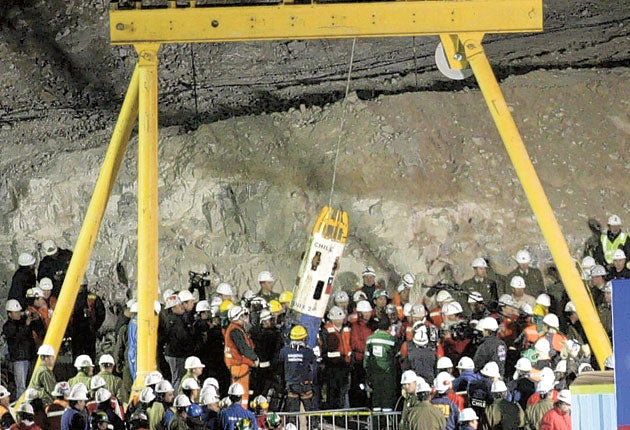Supporting cast leaves the stage at end of the greatest show on earth
All week, millions watched the rescue of 'Los 33'. Now the site of the miracle is just another hole in the ground. Guy Adams bids farewell to the San Jose mine

Alfonso Avalos spent yesterday morning folding up the last of his Chilean flags, and attempting to squeeze an eclectic selection of his worldly goods into the suitcases he had first carried up the rocky hillside that was to become Camp Hope more than two months ago.
Fitting two tents, along with a wide-ranging selection of pots and pans, into the available space was proving to be quite a challenge. So he took a break from his labours to sing a final folk song with some of the neighbours who have shared the ups and downs of an extraordinary vigil.
Just three nights ago, the eyes of the world were on Alfonso, a quiet, dignified man, as he watched his son, Florencio, become the first member of "Los 33" to step out of the Phoenix escape capsule and into the cold night air of Chile's Atacama desert. Roughly 12 hours later, his elder son, Samuel, who was also trapped, joined them at the surface.
"In just a few hours, both the boys are coming home!" he said. "They've got the all-clear from the doctors to leave hospital and we hope to welcome them tonight. We'll never forget this place, of course, but I am very, very happy to be finally leaving. This is a beautiful day, isn't it?"
It was a similar story across Camp Hope, as the families of the now-famous 33 miners packed up their belongings and prepared to bid farewell to the place that had been their home for 69 long nights. Only a couple of camera crews were left to watch them, from the hundreds which gathered earlier in the week.
Trucks whisked away portable toilets, showers and other remains of a sprawling media circus. Workmen cleaned up litter and dismantled wooden platforms from which the BBC and other networks broadcast live for 36 straight hours. One lorry went down the untidy road that carried some of the miners back to Copiapo on Wednesday night, hosing it clean with pressurised water.
Back in town, new details were starting to emerge of the incredible ordeal the miners endured in the days between the disaster on 5 August and the moment they were first located. According to relatives it took three terrifying hours, from the moment of the original rock-fall that trapped them, for the dust in the mine to clear enough for the men to even be able to see each other.
The first five days were the hardest, since they heard no evidence that anyone was even searching for them, according to Luis Urzua, the group's unofficial leader. But after that, they began hearing drilling noises which suggested that some sort of rescue bid was underway.
Food rationing in the 17-day period before they were actually discovered turns out to have been even more severe than previously thought. Previous reports suggested that they'd been given two spoons of tuna, a biscuit and a couple of sips of milk every 48 hours. But they were an exaggeration.
"They only had 10 cans of tuna to share, and some water, but it isn't true the thing about them also having milk, because it was bad, out of date," Alberto Sepulveda, the brother of freed miner Dario, told reporters after visiting Copiapo. Other family members added that the tuna ration amounted to about half a capful from the top of a drinks bottle – and that their only water tasted of oil.
Other dribs and drabs of the men's story have begun to leak out, but none has yet given an interview that shares the tale in great detail. The 33 miners are thought to be co-operating to ensure that earnings from interviews, media appearances, films and books are divided equally among them.
"He said we can't say things to the media without their permission," explained Ximena Alejandra Reygadas, a daughter of 56-year-old miner Omar Reygadas, in a conversation with the Associated Press. "He said they need to decide [as a group] what we can tell the media."
Pablo Ramirez, a former shift foreman at the San Jose mine who was involved in the rescue bid, revealed that the 33 men have hired an accountant to track their income from public appearances, and equitably distribute it.
"More than anything, I think the idea is to charge for the rights to everything that's been shown about their personal life, of their odyssey. That way, they're safe," he said. "They're going to keep things very close to their chests and speak together as a group."
No one knows what will become of the San Jose mine, though there are rumours that several miners will pay a return visit at the weekend. The cause of the rock fall remains under investigation, with lawsuits and possible criminal charges pending against the San Esteban Mining Company, which owns it.
For now, though, the relatives who camped there for so long are simply happy to leave. "Last night, we slept in a bed for the first time in two months," said Silvia Segovia, a sister of the miner, Victor, as she cleared away the last of her belongings. "I'd forgotten what it's like to get a proper night's sleep."
Subscribe to Independent Premium to bookmark this article
Want to bookmark your favourite articles and stories to read or reference later? Start your Independent Premium subscription today.

Join our commenting forum
Join thought-provoking conversations, follow other Independent readers and see their replies